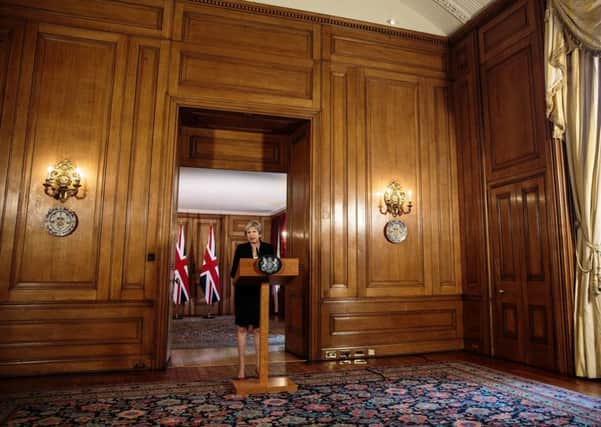A remarkable display of unionism from Theresa May, despite great pressure on her to agree a border in the Irish Sea


For some months now the government has been emphasising that it would never accept an internal customs border, separating Northern Ireland from Great Britain.
But increasingly this appeared to leave open the possibility of a regulatory border in the Irish Sea — in other words, a border with relation to the standards of goods (governed by the EU single market, or any alternative arrangement) as opposed to a border in relation to tariffs (governed by the EU customs union, or any alternative arrangement).
Advertisement
Hide AdAdvertisement
Hide AdOn Thursday we asked Downing Street about the specific matter of a regulatory border in the Irish Sea. The response was not encouraging.
A spokesperson for Theresa May said: “The PM has always made our position on this very clear – we cannot accept a border down the Irish Sea. And last night, she added ‘what we cannot accept is seeing NI carved away from the UK customs territory because regardless of where the checks will be, what that would mean would be a challenge to our constitutional and economic integrity.’”
See the apparent sleight of hand? The answer did not use the word regulations, and referred instead to a customs border, about which we had not asked.
Then, as happens in politics, events overtook that reply from No 10.
Advertisement
Hide AdAdvertisement
Hide AdMrs May suffered a bruising rejection of her Chequers plan by the leading EU figure Donald Tusk in Salzburg, and yesterday came out fighting. Clearly angered at the dismissal, she said in her blistering seven minute speech that one set of EU interpretation Brexit proposals would mean “Northern Ireland would effectively remain in the customs union and parts of the single market, permanently separated economically from the rest of the UK by a border down the Irish Sea.
“Parliament has already — unanimously — rejected this idea.
“Creating any form of customs border between Northern Ireland and the rest of the UK would not respect that Northern Ireland is an integral part of the United Kingdom, in line with the principle of consent, as set out clearly in the Belfast/Good Friday Agreement.
“It is something I will never agree to — indeed, in my judgement it is something no British prime minister would ever agree to. If the EU believe I will, they are making a fundamental mistake.”
This is remarkably emphatic and very encouraging for unionists. If ever there was a time when it would be tempting for London to throw unionists aside in the bid for an EU deal this is it, but Mrs May could not have been clearer.
Advertisement
Hide AdAdvertisement
Hide AdNote how the Sunday Times political editor Tim Shipman spoke for millions of Britons when he tweeted this week: ‘Most people in Britain don’t give a monkeys about Northern Ireland. They think it’s a strange sectarian place and feel more at home in Cork, Washington or Paris than Belfast. Theresa May does not share this view but she might have to come around to it to get out of this mess.’
It seems however that Mrs May is prepared to risk no deal on Brexit rather than betray part of the nation, ie Northern Ireland, in this way.
She even almost appeared to address News Letter concerns directly (!) when she said that coming UK proposals on the Irish border “will be in line with the commitments we made back in December — including the commitment that no new regulatory barriers should be created between Northern Ireland and the rest of the UK unless the Northern Ireland Executive and Assembly agree”.
As it happens I have grave concerns about that clause because there is already a Stormont majority for such an Irish Sea border, so I see a future Sinn Fein-led crisis on that point. Unionists will forever have to rely on the petition of concern or an equivalent mechanism to block a regulatory border in the Irish Sea.
Advertisement
Hide AdAdvertisement
Hide AdBut while that is a serious long-term concern, at the moment it seems like London has finally snapped with this incessant EU-Dublin pressure on the Irish land border.
If all is as it seems, then this could be one of the most significant moments for unionism in the history of Northern Ireland.
It depends on whether this resolution is merely happening because Mrs May is dependent on the DUP or whether it is a reflection of cross-party support at Westminster for the notion of Northern Ireland as an integral part of the UK.
If the latter then it is what you might call support that exists for NI among the political elites.
Advertisement
Hide AdAdvertisement
Hide AdIf so, this would be regardless of the dismissive attitude to us that Mr Shipman, probably correctly, perceives in much of the general population.
There is however a long way to go in this Brexit roller coaster and there are still big perils ahead for Northern Ireland, and indeed the whole UK.
A sudden betrayal of Ulster, the perpetual fear of unionists, does not seem as likely as it did last week.
• Ben Lowry (@BenLowry2) is News Letter deputy editor